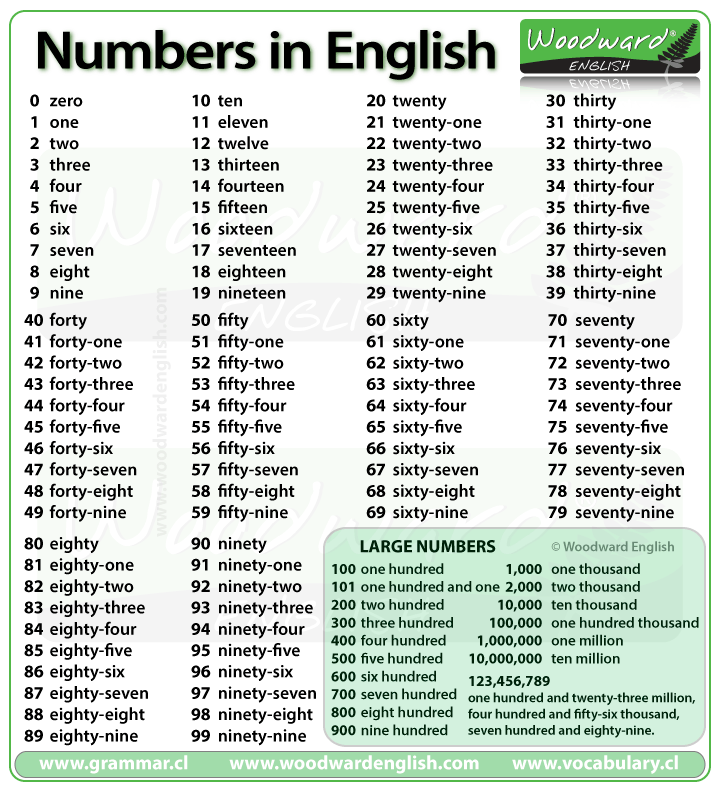NUMBERS
There are two main types of numbers:
- Cardinal Numbers - 1 (one), 2 (two) etc. (Used mainly for counting)
- Ordinal Numbers - 1st (first), 2nd (second) etc. (Used mainly for putting things in a sequence)
Cardinal Numbers are normally used when you:
- count things: I have two brothers. There are thirty-one days in January.
- give your age: I am thirty-three years old. My sister is twenty-seven years old.
- give your telephone number: Our phone number is two-six-three, three-eight-four-seven. (481-2240)
- give years: She was born in nineteen seventy-five (1975). America was discovered in fourteen ninety-two
Notice how we divide the year into two parts. This is the form for
year up to 1999. For the year 2000 and on, we say two thousand
(2000), two thousand and one (2001), two thousand and two (2002) etc.
Ordinal Numbers
You can normally create Ordinal numbers by adding
-TH to the end of a Cardinal Number.
Ordinal numbers are normally used when you:
- give a date: My birthday is on the 27th of January. (Twenty-seventh of January)
- put things in a sequence or order: Liverpool came second in the football league last year.
- give the floor of a building: His office is on the tenth floor.
- have birthdays: He had a huge party for his twenty-first birthday.
Cardinal Numbers
- 1 - one
- 2 - two
- 3 - three
- 4 - four
- 5 - five
- 6 - six
- 7 - seven
- 8 - eight
- 9 - nine
- 10 - ten
- 11 - eleven
- 12 - twelve
- 13 - thirteen
- 14 - fourteen
- 15 - fifteen
- 16 - sixteen
- 17 - seventeen
- 18 - eighteen
- 19 - nineteen
- 20 - twenty
- 21 - twenty-one
- 22 - twenty-two
- 23 - twenty-three
- 30 - thirty
- 40 - forty
- 50 - fifty
- 60 - sixty
- 70 - seventy
- 80 - eighty
- 90 - ninety
- 100 - one hundred*
- 101 - one hundred and one
- 200 - two hundred
- 300 - three hundred
- 1000 - one thousand
- 1,000,000 - one million
- 10,000,000 - ten million
* Instead of saying One Hundred, you can say A hundred.
e.g. (127) one hundred and twenty-seven OR (127) a hundred and twenty-seven.
The same rule applies for one thousand (a thousand) and one million (a million)
Notice that you need to use a hyphen (-) when you write the numbers between 21 and 99.
With long numbers, we usually divide them into groups of three which are divided by a comma.
e.g. 5000000 (5 million) is normally written as 5,000,000

Ordinal Numbers
- 1st - first
- 2nd - second
- 3rd - third
- 4th - fourth
- 5th - fifth
- 6th - sixth
- 7th - seventh
- 8th - eighth
- 9th - ninth
- 10th - tenth
- 11th - eleventh
- 12th - twelfth
- 13th - thirteenth
- 14th - fourteenth
- 15th - fifteenth
- 16th - sixteenth
- 17th - seventeenth
- 18th - eighteenth
- 19th - nineteenth
- 20th - twentieth
- 21st - twenty-first
- 22nd - twenty-second
- 23rd - twenty-third
- 30th - thirtieth
- 40th - fortieth
- 50th - fiftieth
- 60th - sixtieth
- 70th - seventieth
- 80th - eightieth
- 90th - ninetieth
- 100th - hundredth
- 101st - hundred and first
- 200th - two hundredth
- 300th - three hundredth
- 1,000th - thousandth
- 1,000,000th - ten millionth
The Number 0
We normally say 'zero' for the number '0'.
BUT when we give our telephone number, we often say O like the name of the letter O.
e.g. 505-1023 = five-O-five, one-O-two-three
Fractions and Decimals
We use ordinal numbers (at the end position) to talk about fractions.
- 1/2 - a half
- 1/3 - a third
- 2/3 - two thirds
- 1/4 - a quarter (a fourth)
- 3/4 - three quarters (three fourths)
- 1/5 - a fifth
- 2/5 - two fifths
- 1/6 - a sixth
- 5/6 - five sixths
- 1/7 - a seventh
- 1/8 - an eighth
- 1/10 - a tenth
- 7/10 - seven tenths
- 1/20 - a twentieth
- 47/100 - forty-seven hundredths
- 1/100 - a hundredth
- 1/1,000 - a thousandth
Notice that for 1/4, you can say a quarter OR a fourth.
IF we have a whole number with a fraction, we use the word AND between the two parts.
e.g. 2 3/5 = two and a three-fifths
For parts of whole numbers, we use a decimal point (and NOT a comma).
e.g. 2 1/2 (two and a half) = 2.5 (two point five)
If there is more than one number after the decimal point, we say each number individually.
e.g. 3,456.789 = three thousand, four hundred and fifty-six point seven eight nine.
The exception to this rule is when we are talking about dollars and cents (or pound and pence)
e.g. $21.95 = twenty-one dollars, ninety-five (cents). Saying the word cents at the end is optional.
Exercises:
http://www.englisch-hilfen.de/en/exercises/various/numbers_digits.htm
http://eolf.univ-fcomte.fr/wp-content/uploads/grammar/numbers/06.htm
http://michel.barbot.pagesperso-orange.fr/cap/num/fig2ter.htm
http://michel.barbot.pagesperso-orange.fr/cap/num/fig1.htm










